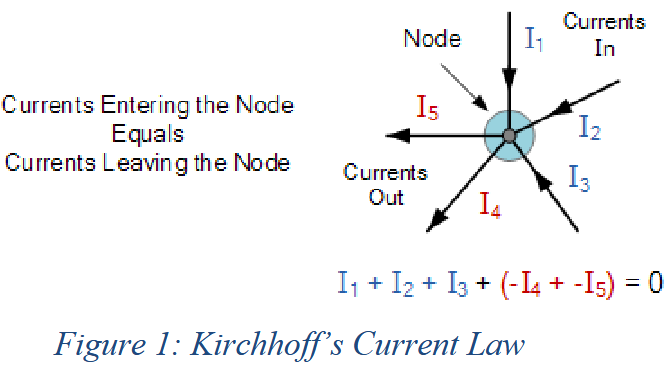AP Physics C E&M- 11.7 Kirchhoff's Junction Rule- Study Notes- New Syllabus
AP Physics C E&M- 11.7 Kirchhoff’s Junction Rule – Study Notes
AP Physics C E&M- 11.7 Kirchhoff’s Junction Rule – Study Notes – per latest Syllabus.
Key Concepts:
- Kirchhoff’s Junction Rule
Kirchhoff’s Junction Rule
Kirchhoff’s junction rule is based on the conservation of electric charge. At any junction (node) in an electrical circuit, the total current entering the junction must equal the total current leaving the junction.
Relevant Equation:
\( \mathrm{\sum I_{in} = \sum I_{out}} \)
- \(\mathrm{I_{in}}\) = current entering the junction
- \(\mathrm{I_{out}}\) = current leaving the junction
Interpretation:
- The rule is a direct consequence of the conservation of electric charge: charge cannot accumulate at a junction.
- Currents are treated as positive in the direction they enter/leave, depending on the chosen sign convention.
- The junction rule is most useful in analyzing complex circuits with parallel branches.
Key Idea: Whatever current flows into a junction must flow out, ensuring that electric charge is conserved at all times.
Example
At a junction, currents of \( I_1 = 3.0 \, A \) and \( I_2 = 2.0 \, A \) flow into the junction, while current \( I_3 \) flows out. Find \( I_3 \).
▶️ Answer/Explanation
Step 1: Apply junction rule: \( \mathrm{I_1 + I_2 = I_3} \).
Step 2: Substitute: \( \mathrm{3.0 + 2.0 = I_3} \).
Step 3: \( \mathrm{I_3 = 5.0 \, A} \).
Final Answer: The outgoing current is \( \mathrm{5.0 \, A} \).
Example
A current of \( I = 6.0 \, A \) enters a junction and splits into two branches. If branch 1 carries \( I_1 = 2.0 \, A \), find the current \( I_2 \) in branch 2.
▶️ Answer/Explanation
Step 1: Apply junction rule: \( \mathrm{I = I_1 + I_2} \).
Step 2: Substitute: \( \mathrm{6.0 = 2.0 + I_2} \).
Step 3: \( \mathrm{I_2 = 4.0 \, A} \).
Final Answer: The second branch carries \( \mathrm{4.0 \, A} \).
